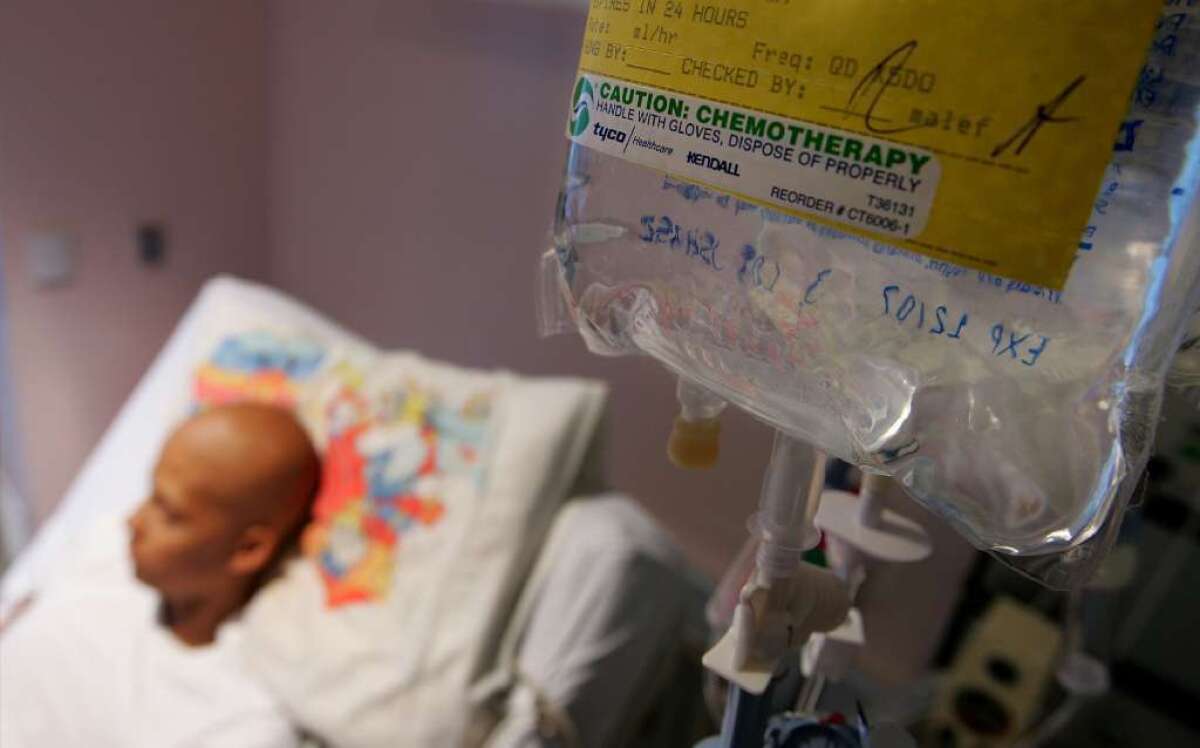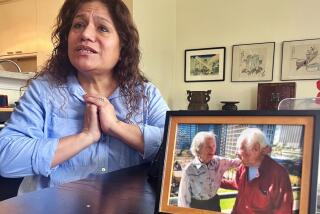Op-Ed: A radical cancer therapy: Don’t treat

- Share via
We learned about my husband’s inoperable brain tumor from a nurse who doled out the news as though providing his cholesterol count. Mark stood frozen. I clutched at him and wailed.
“Are you OK?” the nurse asked.
Was she insane? Which part of this could remotely be described as OK?
Mark worried about how we would tell the kids, three adult children from his first marriage and our 11-year-old daughter.
“We will tell them,” he said thoughtfully, “that we hit a rough patch.” Only Mark could refer to a widespread brain tumor as a “rough patch.”
My husband was a hardcore journalist, relentless in pursuit of a good story, no matter whose sacred cow he skewered. He was also a really smart guy, winning a scholarship to Harvard University from a San Bernardino public school. He began studying chess at age 15 and eventually became a ranked master. After leaving newspapers, he ran his own public relations firm. His greatest fear, he later told me, was that something might happen to his brain.
After diagnosis, we hit the ground running, signing on with a top doctor at UCLA. Quality of life, we told him, was our most important priority. But when he offered hope that Mark might be able to gain another five years of life, we leapt at the chance.
Still reeling from the diagnosis, we readily agreed to the arduous treatment course the specialist suggested: six weeks of chemotherapy and radiation conducted concurrently. This would be followed by five days of chemo every month. At 58, Mark was relatively young and strong, and a doctor told us that 50% of the UCLA patients with his kind of tumor were alive after five years.
We never thought about that other 50%, and when we discussed treatment options, no one proposed the most basic: Do nothing.
But amid the flurry of medical meetings, a friend introduced Mark to a doctor who had also been diagnosed with a brain tumor, though one considered less aggressive. Mark spoke with him. Oddly enough, this fellow had passed up certain treatments. Why, we wondered, would he do that?
Why? Because doctors don’t die like the rest of us.
Physicians often decline treatment in cases of terminal illness, wrote Dr. Ken Murray in “How Doctors Die,” an essay for the Zocalo Public Square website.
“What’s unusual about [doctors],” Murray wrote, “is not how much treatment they get compared to most Americans, but how little.”
Physicians are much more likely than the general public to sign a living will, specifying what, if any, treatments they want in the event of serious illness, according to a 2003 study.
In a recent Stanford University School of Medicine study of 1,081 doctors, 88% said they would choose a do-not-resuscitate order for themselves. Further, this group agreed they did not want treatment if they had an “incurable and irreversible condition that will result in … death.”
Doctors are more familiar not just with death but with the foibles of trying to flout it.
“Of course, doctors don’t want to die,” wrote Murray. “But they know enough about modern medicine to know its limits.”
In the case of the physician who spoke to my husband, he declined treatments when he found conflicting opinions about their efficacy. “I am not anti-therapy,” he said. “I am for evidence-based therapy.”
What about the rest of us? We depend on doctors to level with us. But do they?
“The overall quality of communication between clinicians and patients with advanced illness is poor, particularly with respect to discussing prognosis,” according to a recently released Institute of Medicine report.
Still, hard truths sometimes come out. As Mark climbed atop the table for his first radiation dose, he turned to the radiologist and asked how long he was likely to live. Without blinking, the radiologist replied: “At best, a year and a half.”
By the end of six weeks of chemotherapy and radiation, Mark could no longer walk. Without warning, he would get dizzy and fall to the floor, a phenomenon doctors could not explain. Despite our repeated entreaties about preserving Mark’s quality of life, the doctors advised staying the course.
That meant a series of terrifying episodes. One afternoon, Mark walked into a public restroom and locked the door. As I waited for him, I heard a crash and realized I could not enter the bathroom.
Days after another fall, Mark ended up in the hospital. Under the influence of anti-seizure medication, he had begun to hallucinate. Strange fish dived at him from the ceiling. I had to put myself between him and a hospital nurse he thought was trying to harm him.
After the next round of chemo, Mark again landed in the hospital, where his condition worsened rapidly. He was bedbound and, often, unresponsive. It was hard to know if he knew me. Within weeks, even the doctors recommended hospice.
“It is possible,” the oncologist said, “that treatment made Mark’s tumor grow rather than shrink.”
Mark defied all odds and predictions, regaining strength and lucidity while in hospice care. He began walking again. His oldest son played piano for Mark, and they enjoyed late night movies on a bedside TV. Mark watched Stephen Colbert with our young daughter cuddled next to him. He went fishing with the kids and shot guns at a range with friends.
I read aloud to Mark, poetry and short stories. And finally, one day I read him Murray’s essay. Mark listened carefully, and then he comforted me. “If I had the slightest chance of living longer with treatment, then of course we would have to try.”
But I also realized my husband had no memory of the various stages of his illness. He could not recollect all the falls, hallucinations and hospitalizations.
If I were granted a do-over, would I subject him to treatment, knowing it might turn out as it did? No. But oncologists, as a doctor friend put it, are peddlers of hope, and non-treatment was never presented as an option.
Only at the end, after we opted out, did it feel like Mark grappled with the cancer on his own terms.
Ten months after his diagnosis, my husband died with me by his side in bed at home.
Nora Zamichow is a Los Angeles journalist and former Times staff writer.
Twitter: @Zamichow
More to Read
Sign up for Essential California
The most important California stories and recommendations in your inbox every morning.
You may occasionally receive promotional content from the Los Angeles Times.










